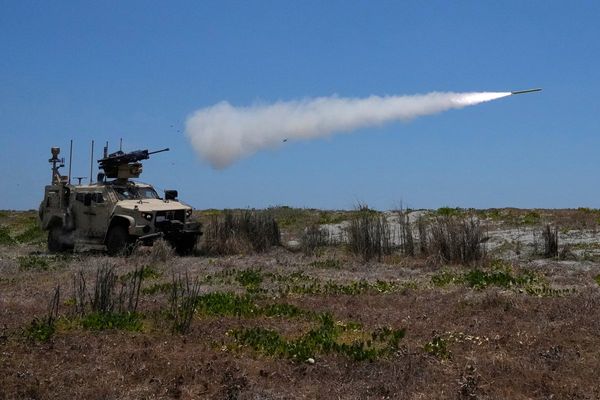
What is an American car? Is it a Ford Mustang Mach-E made in Mexico? A Mercedes-Benz made in Alabama? A Tesla made in Shanghai and shipped to Canada?
The modern auto industry is a complicated one that's built around a complex web of global supply networks. And if President Donald Trump makes good on his threat of 25% tariffs on all non-U.S.-made cars and parts this week, it will throw that network into a level of turmoil that will make COVID-19 look like an office cold.
That will have plenty of implications for the move to electrification as well, as we'll cover on today's edition of our Critical Materials morning news roundup. Also on deck today: Toyota's hybrids are so popular that the automaker is struggling to keep them in stock. Let's dig in.
30%: Auto Industry Hits The Panic Button As Tariffs Loom

Believe me when I say I'd rather InsideEVs be writing about new cars coming out, new battery technologies, the autonomous vehicle race or how the rest of the industry is trying to catch up to China. But you're going to hear a lot about tariffs this week because if Trump's plans go into effect, they could hit reset on the current order of things as we understand it. Tariffs are expected to go into effect on Wednesday, April 2.
Trump calls it "Liberation Day," meaning a kind of celebration that marks America's freedom from very unfair trade deals, or something. He said his goal is to get more cars made in America, and with American-made parts. While it's true that American auto industry jobs have been offshored for decades now to places like Mexico and Canada (which is why the United Auto Workers are suddenly supportive of the tariffs) the immediate effect is that car prices will go up as automakers seek to offset these additional costs.
That seems... not great for American consumers. But here's what Trump told Kristen Welker this weekend on NBC's Meet The Press:
Asked what his recent message was to motor industry CEOs, and whether he had warned them against raising prices, Trump said, “The message is congratulations, if you make your car in the United States, you’re going to make a lot of money. If you don’t, you’re going to have to probably come to the United States, because if you make your car in the United States, there is no tariff.”
When pressed if he told CEOs not to raise prices, as reported in the The Wall Street Journal, Trump added, “No, I never said that. I couldn’t care less if they raise prices, because people are going to start buying American-made cars.”
Trump continued, “I couldn’t care less. I hope they raise their prices, because if they do, people are gonna buy American-made cars. We have plenty.”
America does have plenty of those. But make no mistake: that includes American-made cars because parts will get more expensive, too. "These included estimates for Ford, GM, Chrysler, Honda, Toyota, and other vehicles of around $4,000 to $10,000 for most vehicles, and $12,000 or more for EVs," a recent Anderson Economic Group report said.
The latter situation is, obviously, especially relevant to us. Right now, federal investments in the charging infrastructure are drying up, EV tax credits could get axed and emissions and fuel economy targets driving electric growth are likely to be rolled back. Add in giant price increases on EVs thanks to tariffs and you have a very difficult situation for any automaker to navigate—right as sales continue to grow past expectations for 2025.
And yes, even Tesla will be affected by these price increases too. No car exists that is completely American-made with entirely American parts. Setting up a supply chain to do that could take years, if it's even possible at all.
60%: Mercedes-Benz Tried To Be American, Gets The Hammer Anyway

Case in point: Mercedes-Benz. The Wall Street Journal has a new story outlining how even its huge U.S. investments, which have spanned decades and were stepped up recently to meet the EV era, aren't enough to fully protect the company from the deluge of tariffs:
Under President Trump’s new auto tariffs, even those made-in-USA vehicles aren’t American enough.
Roughly two-thirds of the 324,500 vehicles Mercedes shipped to dealers in the U.S. last year were imported, and even the popular GLE and GLS SUVs it assembled in Tuscaloosa, Ala., used engines and transmissions from Europe. New U.S. tariffs could cost the company $1.7 billion this year, according to brokerage Bernstein—14% of expected operating profit. Parts account for roughly a third of the potential impact.
That is before any potential retaliation by U.S. trading partners. Mercedes exports most of the vehicles assembled in Tuscaloosa, exposing it to tit-for-tat tariffs.
For the 2025-model year, just 10% of the content of the SUVs Mercedes builds in Tuscaloosa comes from the U.S. or Canada, according to official labeling reports. Mercedes said its own analysis points to a U.S. content share of 35% to 40%, using the same methodology. The local-content share of BMW’s U.S. products is just under a third, according to the official reports, which the company declined to comment on.
Unlike Toyota, they don’t sell most models in volumes that can justify local assembly or parts manufacture. At the same time, they can’t simply ship everything from Europe and recoup tariffs from customers or absorb the extra cost, as Ferrari is doing. The Italian sports-car maker said Thursday it would increase prices by up to 10% for some models and reiterated its financial targets for 2025.
It certainly doesn't help that Mercedes invested a ton of money to make its EQE SUV and EQS SUV in America, only for them to not sell very well. But here's what one consultant had to say about this situation: "It’s often underestimated how many years this industry will take to adapt to this completely new setting. It will take time and money.”
We're in for a very interesting week.
90%: Toyota Can't Keep Pace With Hybrid Demand

Lately, it seems that Toyota is finally getting serious about its EVs. That's great news for electric cars going mainstream, frankly. But in the interim, no one can deny that Toyota's hybrid push has paid off handsomely—so much so, that it's hard to buy one. Here's Reuters to explain:
Soaring demand for Toyota's gasoline-electric hybrids has left suppliers struggling to keep pace, leading to shortages of parts and months-long waits for car buyers, according to four people familiar with the situation.
Stocks of hybrids are low at Toyota dealers across major markets, including the U.S., Japan, China and Europe, two of the people told Reuters.
Toyota's European customers are waiting on average 60 to 70 days for new hybrids, about double the duration in 2020, one of the people said. Vehicles with the heaviest demand and shortest supply in Europe include the Yaris Cross hybrid and RAV4 plug-in hybrid, according to Toyota. In Japan, buyers are waiting two to five months for many models, a Toyota website shows.
At one U.S. West Coast dealership, Prius hybrids were sold out in mid-February and just a handful of Camry hybrids were available, another person said.
The problem isn't just demand. It's also supply:
The delays stem from a tight supply of components used in hybrid powertrains, which are largely made in Japan and shipped abroad to where cars are assembled, said two of the people, who like others were granted anonymity because they weren't authorized to disclose the information.
A shortage of magnets used in parts supplied to Aisin Corp has emerged as one pain point, one of the people said.As a result, Aisin, one of the Toyota group's largest component makers, wasn't able to get rotors and stators from its suppliers, delaying delivery of hybrid motors to Toyota, this person said. While the magnets were sourced from Japan and China, the resulting supply issue for Aisin was global, the person said.
Similarly, the Toyota group's top components maker, Denso, has been affected by bottlenecks at second- and third-tier suppliers that caused delays with deliveries of its inverters, another person said. Inverters convert the battery's current and are used to control the motor.
This is a good lesson in how, even though the batteries are smaller, ramping up the hybrid supply chain can be just as difficult.
100%: What's Your Car-Buying Plan Now?

It's still a big if as to whether Trump will go through with these tariffs, and for how long they'll last. Previously, the president has said the tariffs will be "permanent," but he has also said he's certainly open to making some kind of deal with other car-producing countries as well.
Tell us: how do potential tariffs impact your car-buying plans? Are you trying to buy something ASAP, or are you in wait-and-see mode now? And how will this impact the trajectory of EV sales in America? Sound off in the comments.
Contact the author: patrick.george@insideevs.com







